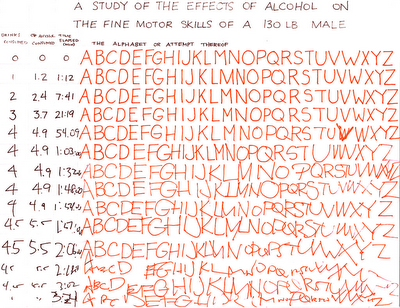Chapter LXXI: A Toast to Science
Image of the Day: A Study of the Effects of Alcohol Consumption on the Fine Motor Skills of a 130# Male (click to Enlarge)
Research Objectives: To observe (1) how the volume of alcohol consumed affects fine motor coordination and (2) how the passage of time affects the effect of the volume of alcohol consumed on fine motor coordination.
Research Methodology: (1) and (2) above are determined by the relative legibility of the subject's handwriting.
A baseline legibility is established before the subject has consumed any alcohol (first row), at which point a timer is started. At time intervals roughly increasing by factors of two (6 minutes, 14 minutes, 30 minutes), 1 shot of vodka is consumed (each containing approximately 1.2 oz of alcohol), and a handwriting sample is taken, until 1 hour has elapsed.
At that point, no further alcohol is consumed and handwriting samples are taken about every 10 minutes.
Conclusions: Against all rational expectations, it appears alcohol consumption has a marked effect on fine motor skills. The subject's legibility seems to degrade exponentially as time progresses.
Interestingly, it appears that the penmanship progressively deteriorated inward from the end of the alphabet. It is unknown whether this is due to the relative paucity of the latter letters in everyday experience, or simply because the subject's concentration was exhausted by the time he got to them.
Recommendations: Don't drink and write (or drive).
Peer Review: The study attempted to simultaneously track two independent variables (volume of alcohol consumed, and time) rendering the relative weight of each indeterminable. Furthermore, no mechanism has been formulated to quantify the dependent variable--legibility--and so the claim that it deteriorated exponentially is invalid. The study used an absurdly small sample population of one person, who also happened to be the researcher. Thus, double-blind procedure was not followed (or even single-blind procedure), running the risk of confirmation bias. Indeed, it appears this exercise was nothing more than a dumb excuse to become intoxicated, albeit slightly less dumb than previous ones.

No comments:
Post a Comment